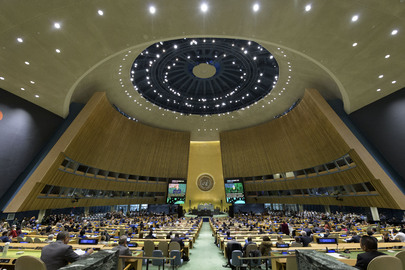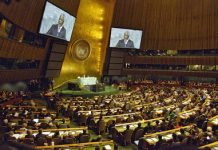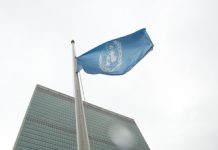Speaking on Thursday at a press conference in Geneva, Tedros said that in around 25 per cent of countries, some health facilities have had to close completely due to cuts, according to figures from more than 100 countries compiled by WHO.
Severe disruptions
Out-of-pocket payments for health services have led to disruptions to the supply of medicines and other health products, as well as rising job losses in the healthcare sector.
As a result, “countries are revising budgets, cutting costs and strengthening fundraising and partnerships,” said the UN health agency chief.
From aid dependency to self-reliance
Having to revise budgets, cut costs and strengthen partnerships and fundraising, some countries are relying on WHO’s support to transition away from aid dependency towards sustainable self-reliance.
“We are now supporting countries to accelerate that transition,” said Tedros, citing examples of countries such as South Africa and Kenya, who are successfully working towards averting the health impacts of sudden and unplanned cuts.
WHO recommendations
Tedros provided countries with several recommendations on ways to mitigate funding cuts:
- The world’s poorest populations need prioritising by limiting their exposure to out-of-pocket spending
- Resist reductions in public health spending and protect health budgets
- Channel donor funds through national budgets, rather than parallel donation systems
- Avoid cutting services or closing facilities, and absorb as much of the impact as possible through efficiency gains in health system
New revenue sources
Through short and long-term tools, WHO also encourages countries to generate new sources of revenues.
Immediate measures such as introducing or increasing taxes on products that harm public health is another effective tool to maintain spending on health, he added.
Countries such Colombia and the Gambia, who in recent years have introduced such taxes, have seen revenues increase and consumption fall, said Tedros.
In the longer term, WHO is advocating for social and community-based health insurance policies, where individuals or families can contribute a small amount to a fund which boosts health service financing.
Although not all measures will be right for every country, WHO is “working with affected countries to identify which measures are best for them, and to tailor those measures accordingly.”
Source of original article: United Nations (news.un.org). Photo credit: UN. The content of this article does not necessarily reflect the views or opinion of Global Diaspora News (www.globaldiasporanews.net).
To submit your press release: (https://www.globaldiasporanews.com/pr).
To advertise on Global Diaspora News: (www.globaldiasporanews.com/ads).
Sign up to Global Diaspora News newsletter (https://www.globaldiasporanews.com/newsletter/) to start receiving updates and opportunities directly in your email inbox for free.





























